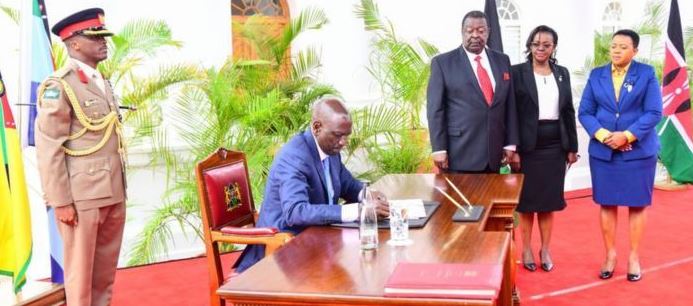President Ruto's Administration Implements Measures to Stabilize Interest Rates on Loans
In a bid to provide relief to Kenyan borrowers, President William Ruto's administration has initiated a strategy to reduce domestic borrowing from local banks by Ksh270 billion within the current financial year. The move is expected to contribute to the stabilization and reduction of interest rates on loans extended to citizens.
The Central Bank of Kenya (CBK) revealed that the Treasury has revised its domestic borrowing target downward, from an initial Ksh586.5 billion to Ksh316 billion. This reduction is poised to encourage banks to extend loans to Kenyans at more favorable and affordable interest rates.
Over the past years, increased domestic borrowing has led banks to prioritize lending to the government rather than private individuals, as government borrowing is considered less risky. This shift has often resulted in higher interest rates for private borrowers.
"We believe that with the reduced domestic borrowing, we will see a reduction in the pressure on interest rates," stated CBK Governor Kamau Thugge, highlighting the potential positive impact of this move on the lending landscape.
This strategic decision to lower domestic borrowing aligns with the broader effort to cut the budget deficit of the Ksh3.6 trillion budget presented to parliament in June. The budget operations for the fiscal year 2022/23 have contributed to a reduced budget deficit of 5.3 per cent of GDP, down from the 6.2 per cent recorded in the previous fiscal year.
The ongoing fiscal consolidation efforts are anticipated to result in a narrower budget deficit of 4.3 per cent of GDP in the fiscal year 2023/24, as outlined by Thugge.
While the potential for lower interest rates is promising, the effectiveness of this strategy hinges on the government's commitment to its implementation. Kenyans stand to benefit from more affordable loans if the plan is successfully carried out.
As the government curtails domestic borrowing, it will simultaneously increase its reliance on external financing sources, such as the International Monetary Fund (IMF) and foreign governments. This shift in borrowing dynamics is expected to bolster the economy and enhance foreign reserves, ensuring that businesses have sufficient access to foreign currency for import purposes.
Already, the government has secured a Ksh142 billion loan from the IMF, with additional funding anticipated from various international banks throughout the year. A recent Treasury report published in July indicated that President Ruto's administration intends to borrow Ksh607 billion externally, signaling a strategic recalibration of borrowing practices to promote economic stability and reduce the burden on borrowers.

